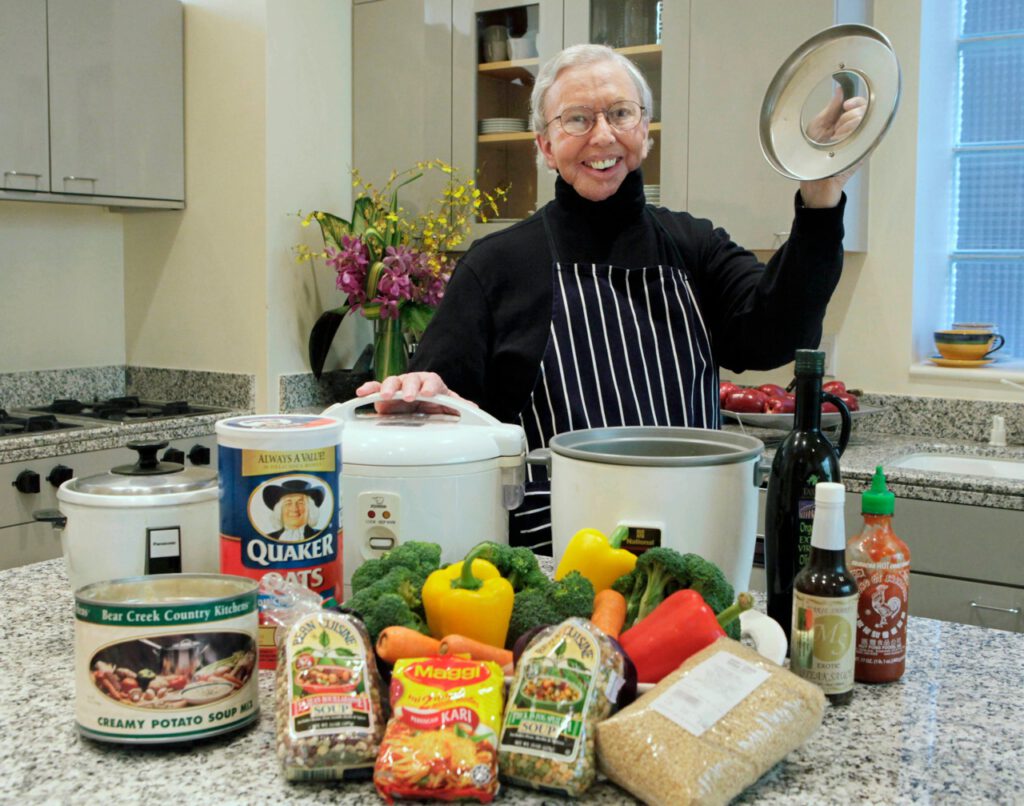CHICAGO — Four years after cancer surgery left the famed film critic unable to speak or eat, Roger Ebert is publishing a cookbook dedicated to rice cookers, a kitchen appliance he lovingly calls “The Pot” and champions as an answer for those strapped for cash, time and counter space.
“To be sure, health problems have prevented me from eating,” Ebert writes in the book. “That did not discourage my cooking. It became an exercise more pure, freed of biological compulsion.”
The idea for his book came after a 2008 blog post he wrote about rice cookers prompted hundreds of comments, with many readers including their favorite recipes. “I think I was somewhat frustrated by not being able to eat and I wanted to live vicariously,” the 68-year-old said during an interview at his Chicago home, his laptop computer speaking his typed answers.
The book includes many of those comments, as well as more than two dozen recipes for dishes such as chili, risotto, jambalaya and oatmeal — Ebert’s favorite. He took a witty and funny tone when writing it; he says he didn’t want it to sound too specialized or difficult.
“The basic recipe is: throw everything in the pot and slam on the lid,” said Ebert, who has battled cancer in his thyroid and salivary gland over the last eight years. He now uses a feeding tube for nourishment. His book, “The Pot and How to Use It. The Mystery and Romance of the Rice Cooker,” will be released Sept. 21.
During his recovery, Ebert turned to social media such as Twitter and his blog, cultivating a tremendous following. And increasingly he’s reached out to mainstream media to tell his story. In February, for example, he talked to Esquire magazine about missing his former late movie review show co-host Gene Siskel, who died in 1999 from complications following surgery to remove a growth from his brain.
And in March, Ebert appeared on “The Oprah Winfrey Show.” During the appearance, he made his Oscar predictions using a computer voice patterned after his own.
Ebert fell in love with the rice cooker after receiving one as a present for his 1992 wedding. The Chicago Sun-Times critic says he even took the rice cooker with him to the Sundance Film Festival, where he would cook with it during his busy movie-viewing schedule.
“We used to take the rice cooker almost everywhere we went,” his wife, Chaz Ebert, said.
Ebert urges his readers to improvise with the recipes and ingredients, saying there are no rules. He also says it is easy to adapt recipes not written for the rice cooker. Someone could go a week using the rice cooker three meals a day, he said.
And how do you learn to use a rice cooker?
“With experience you develop a sixth sense,” he said.
But writing a cookbook when you can’t eat?
It isn’t as sad as one might imagine that he is unable to eat or drink, he wrote in a blog post earlier this year. Rather, he misses the loss of dining with friends and family, rather than the loss of the food itself.
“The food and drink I can do without easily,” Ebert wrote. “The jokes, gossip, laughs, arguments and shared memories I miss.”
And his memory for flavor hasn’t faded. He wrote he has vivid memories of “an entire meal at Steak ‘n Shake, bite by bite” and for the “taste and texture of cheap candy.”
Anna Thomas, author of the cookbook “The Vegetarian Epicure,” wrote an introduction to Ebert’s book. She calls Ebert, who won a Pulitzer in 1975 for his newspaper film criticism, “a Renaissance man” who combines elements of standup comedy and memoir.
“Cooking, for him, I think in the last few years has become a very selfless act,” Thomas said. “This really tells you about Roger. He doesn’t stop living, doing things or being interested in things or having a good time because in a way something changes. But Roger does not get discouraged. He has such a zest for life.”
That zest is reflected in the book’s many small quips: “Grind it fresh in a mortar and pestle,” he writes about cooking with flax seeds. “You don’t have a mortar and pestle? People these days want everything done for them. Do like the Indians did and grind it with the end of a stick in the depression of a boulder.”
Thomas said she sees Ebert enjoying the social aspect of food, the kitchen and cooking.
“It’s something that he has always loved, so it’s not for him that if ‘I can’t taste it and eat it and swallow it then I’m not interested,'” she said. “For Roger, it’s very much his family, his friends and the people around him. He’s there’s for it. He loves it.”
Ebert even says in his book that he wrote it “simply to establish that I enjoy cooking.” Chaz Ebert says though her husband doesn’t cook as much as he used to, he still spends time in the kitchen. She said he chops apples into thin slices for her.
“I think it’s more of an art form for you and the kitchen is such a relaxing place for you,” she told Ebert.
Ebert explains it more simply saying the reason he cooks: “Satisfaction.”












